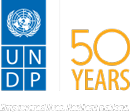About UNDP in Washington DC
UNDP's Washington Representation Office (WRO) acts as a liaison between UNDP and the U.S. government, think tanks, non-governmental organizations (NGOs), as well as academic, diplomatic and media communities.
The WRO works together with partners and serves to inform the U.S. community about UNDP's role, capabilities, programs and results. This is accomplished through speaking engagements, round table discussions, media interviews, photo exhibits, events and small group meetings to name a few.
Located in nearly 170 countries, on a global-level UNDP implements programs that focus upon four main sectors:
- Crisis Prevention and Recovery
- Democracy and Good Governance
- Poverty Reduction
- Energy and the Environment
In addition to focusing upon specific countries and sectors of interest to the United States, the UNDP WRO also works to promote UNDP's organizational successes such as:
- In conjunction with its regular programming, UNDP has been asked by UN Member States to manage an additional US $4 billion of Multi-Donor Trust Funds and Joint Programs for the UN system in support of humanitarian, post-crisis and development activities around the world.
- UNDP produces regular Human Development Reports, that address major development issues at both global and national levels, such as rule of law, water scarcity and anti-corruption.
- UNDP also maintains the widely cited Human Development Index, which provides a way of measuring development by combining indicators of life expectancy, educational attainment and income. The result serves as a reference for both social and economic development progress in quality of life among countries.
- UNDP is at the forefront of UN system efforts to promote transparency and accountability by publishing financial data on its public website and maintaining procedures to continuously evaluate, audit and investigate its global programs. These procedures earned UNDP an “excellent” rating in the recent U.S. State Department “UN Transparency and Accountability Initiative” which assesses UN agencies in these critical areas.




